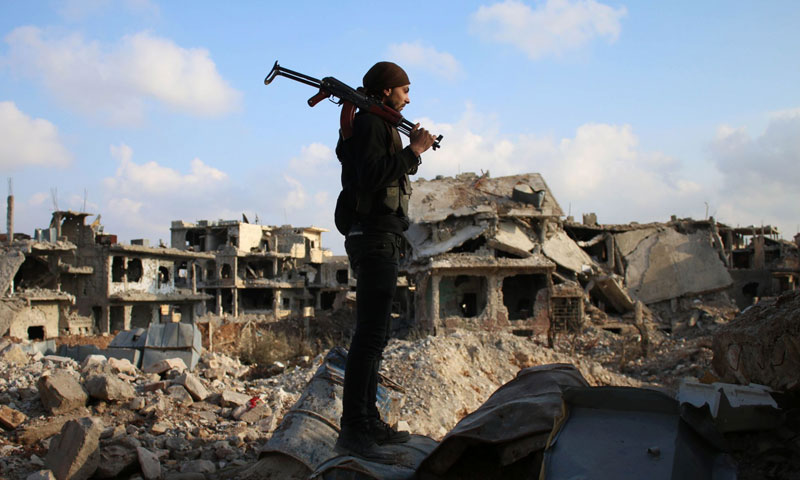



Southern Syria anticipates a new field control map, drawn by both the opposition factions and Assad’s forces in a shift from media threats and statements to air raids.
The talks about the new change followed the explicit Russian threats against Daraa governorate, in the past a few days, the subject of which is the intention to move the battles to Daraa after getting done with Ghouta. The first demarcations of escalation appeared with the return of aircraft to the area’s sky after an eight months disappearance.
The threats were met with the opposition factions’ entering a state of preparedness on the ground and the civilians immersion in a further state of fear and anticipation; the synchronized attitudes of the civilians, the factions and the threatening party triggered questions about the truce in Daraa and the people’s perspective about their area’s future.
Lately, Daraa has witnessed a complete suspension of battles between the Syrian regime and the opposition, and an absence of military aircraft, due to the “de-escalation” agreement, which bestowed the people and the humanitarian organizations in the opposition-held areas with an interval to catch their breath, restore what has been destroyed and reactivate economy and the process of development.
Assad’ forces, for their part, exploited the interval in controlling Beit Jinn in the western countryside of Damascus and pushing the battles to Eastern Ghouta.
Corresponding to the attack on Ghouta, Assad’s forces accused the opposition factions of preparing for battles to be launched against its fronts in Daraa; however, the opposition held the regime accountable for violating the “de-escalation” agreement, after a series of air raids that targeted the cities of the eastern countryside of Daraa, last week.
The humanitarian bodies’ members in Southern Syria expressed their concern over the internal displacement of dozens of thousands of civilians, especially that the military aircraft raids have already targeted crowded cities and towns, such as al-Hirak, Busra al-Harir and al-Ghariyah al-Gharbiyah in the eastern countryside of Daraa, amidst expectations that the potential confrontations’ field might spur massive displacement waves.
Shadi al-Mahasneh, a field official in a relief organization, showed concern about grand displacement spates, pointing that the displaced people’s movement towards the Syrian-Jordanian borders might be one of the suggested solutions.
He believes that the borders would be safer and less liable to bombardment, but the area is not prepared with tents, indicating that: “I do not think that the Jordanian authorities would allow the refugees entry into its territory, which is already having troubles with the massive number of refugees on its territory, threatening to transfer the crisis to the Jordanian neighborhood, a crisis that might extend to throw its shadows onto the regional scenery, at the levels of security and politics.”
Service and humanitarian entities have also expressed concern over the projects which they have been working on for the past months duration, especially those related to the restoration of hospitals, public facilities and supporting the electricity sector with using solar power, triggering a few entities to reconsider some of the projects, in the meantime, and stopping others in a temporary manner.
The local council in the town of Jamrein in rural Daraa started uninstalling the solar power system, which it constructed to generate electricity from one of the water wills, fearing that it might be bombarded and destroyed, a step that might be repeated by other local councils and service entities, which means a drawback for the developmental projects in the southern area.
Due to the talks addressing the upcoming military operations, the civilians are committed to a single attitude, one of fear and anticipation, especially as they are witnessing the spectacles of death and destruction in Ghouta. The people’s suggestions are split, for some are stressing the need to avoid escalation and others are calling for pre-emptive procedures before the arrival of the battles to the governorate.
Salem al-Hashish, a farmer in the western countryside of Daraa, called on the opposition factions to seek securing a regional protection for the area, saying: “After the Russian and the Iranian intervention and using the scorched-earth [policy] we became unable to face the regime militarily, so the regional States must be pressured to intervene, similar to what Turkey has done in Northern Syria, and to protect the civilians from killing and destruction.”
He also told Enab Baladi that the past months have proven that the regional State’s have the power to impose calmness on the area and give it its life back, as well as reaching an ultimate state of cease fire.
Anass al-Zoubi, a merchant in the eastern countryside of Daraa, repeated people’s recurrent demand of the opposition factions to unify, saying: “Unity, now, is more necessary than any time before; there should be a grand battle in the whole south to support Ghouta and prevent the regime from thinking of approaching the area or confronting it at a military level,”
He also told Enab Baladi that all the financial and humane casualties which might result from the confrontation in the southern area are “a necessary evil; we either attack the regime while it is weak or wait for it to attack us with its full force.”
if you think the article contain wrong information or you have additional details Send Correction